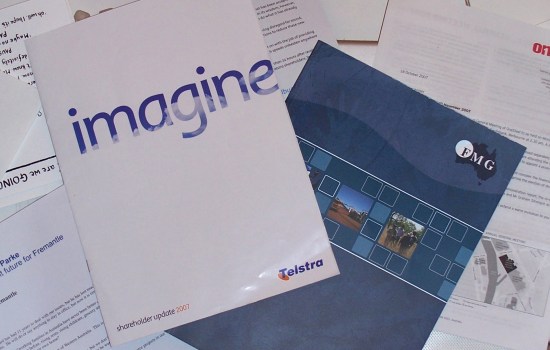- It’s annual report season, which means there are even more documents vying for my attention than normal. Telstra’s one, pictured, reads very much like that of a company slightly stunned as its industry changes around it, and is basically one big whinge at the regulations laid down by the Federal Government. So much so that I’m surprised they haven’t started running ads urging people to not vote Liberal.
- The machinery of the WA public sector is also busily churning out reports, some of which have thrown up headline-worthy allegations. The biggest was last week from the Information Commissioner, an anti-corruption office set up in the 90s, whose foreword complains of being screwed around by the Attorney-General. This gave ripe pickings for a new round of swipes at Jim McGinty — for a while, at least.
- There was also news of enormous shortfalls in the budget for the local Flying Doctor branch, and corruption problems in the Health Department; cue more swipes at Jim McGinty. Collectively, these revelations are not a good look for the Carpenter Government, but with all eyes on Federal matters (why do the papers care so much about a TV debate?) they’re having no trouble getting away with it.
- Last weekend’s local government elections were disappointingly uneventful, though Lisa Scaffidi won (suprisingly easily) the top job at the City of Perth. I look forward to seeing if she lives up to any of the campaign hype, though I can say she’s already brought more glamour and a higher profile to the role than old Peter Nattrass did. (And this at least was more interesting than my local government, where the election was basically just a string of wins for incumbents.)
’Tis the season for heavy reading
By request: an assessment of Labor’s broadband policy
My initial reaction to the Ruddster’s announcement from a week ago (and yesterday’s radio ad) was exactly what the Labor strategists wanted: “wow! faster Internet! that’s cool!”
But on closer scrutiny, I’m not so sure that spending billions of public dollars to cover the country with fibre to the node is the best way to go about fixing the problems in Australia’s broadband. After reading Joshua Gans and Ross Gittins, I’m thinking it’s a step in the right direction, and way ahead of what we’ve seen from Howard so far, but also not the best possible decision.




 Atom feed
Atom feed

